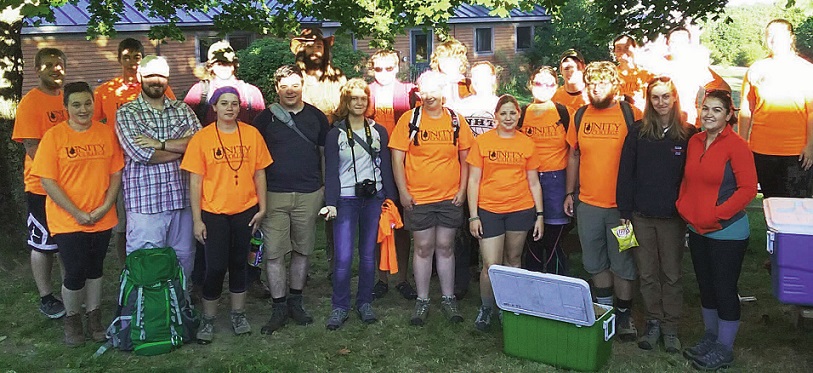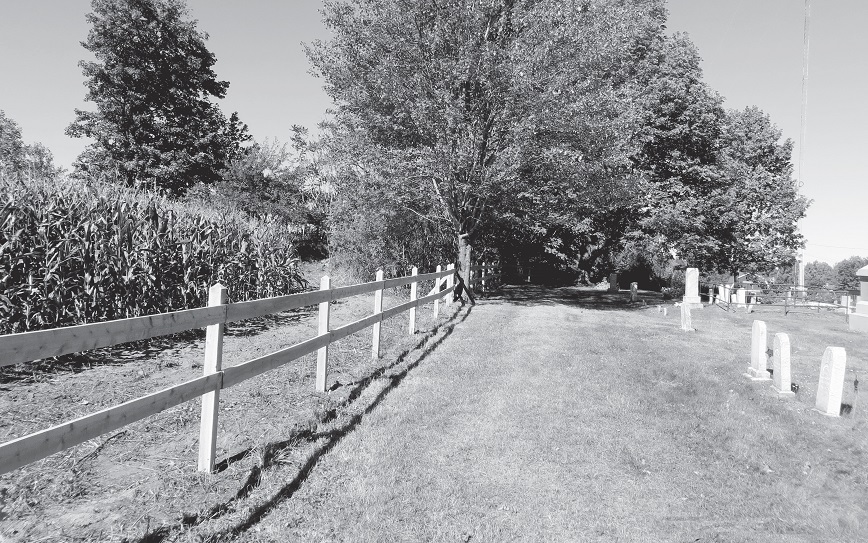Several dozen Unity College students and staff visited Katahdin Woods & Waters National Monument on September 10, in advance of a Unity College talk later this week by Lucas St. Clair, the successful advocate for creation of the national monument.
The goal of Saturday’s outing was to get to know Maine’s newest destination and to scout recreational, curricular, and other opportunities afforded by the new designation. Members of Unity College Student Activities led 33 Unity College students – clad in hunters orange Katahdin Woods and Waters T-shirts – and other members of the Unity College community on hikes, a visit to the ranger station in Millinocket, and other local attractions as part of the trip.

Students and staff who trekked to Katahdin Woods and Water National Monument.
Contributed photo
“We had been following developments on the formation of the national monument quite closely,” Unity College President Dr. Melik Peter Khoury said. “When we heard this exciting news, we wanted to be among the first to bring our students there to check out the possibilities.”
Khoury called the monument designation “a powerful act of philanthropy, of private and public entities working together to share the awesome responsibility of stewarding our natural resources for future generations.”
On August 24, President Barack Obama signed an executive order under the Antiquities Act creating the 87,500-acre Katahdin Woods & Waters National Monument. The move capped a multi-year campaign that balanced values of conservation and industry in an area riven by the collapse of numerous paper mills.
Obama’s order praised the land as rich in culture, natural beauty, and “significant biodiversity,” designated the area a national monument, and directed the National Park Service to manage it for a diverse range of public use.
The monument encompasses the Katahdin region, already a popular destination for outdoor recreation and home to a wide diversity of wildlife, spectacular mountains (including Mount Katahdin, Maine’s highest peak), important historical resources, and areas of great cultural significance. The monument contains opportunities for hiking, camping, mountain biking, fishing, hunting, and snowmobiling; those uses are fully protected and enhanced under the president’s order.
“Not every place in the country has an environment where a new national monument is formed. Our students have a bird’s-eye view of it,” Unity College Associate Professor of Parks and Forest Resources Tom Mullin said. “This is really a perfect live example of conservation in action – a chance to see how preservation works, both at a policy level and on the ground, only two hours from campus.”
The field trip came in advance of a talk on the Unity campus this week by the person who spearheaded the drive to create the national monument.
Elliottsville Plantation Inc. President Lucas St. Clair, who led the successful campaign to have his family’s land declared a national monument, will speak at the Unity College Center for the Performing Arts, 42 Depot St., Unity, as part of the annual Maine Woods Forever roundtable, 10:30 a.m. Friday, September 16. The event – a partnership between Unity College and Maine Woods Forever – is free and open to the public and the media.
“America’s Environmental College continues to help convene conversations that matter deeply to the people of Maine,” Khoury said of St. Clair’s talk. “With academic programs ranging from Wildlife Biology to Adventure Therapy and Parks and Forest Resources, Unity students and faculty are in the perfect position to help evaluate and experience the economic, environmental, and social impact of a major initiative like the new national monument.”
“Because Maine is our classroom, I’m looking forward to talking with Mr. St. Clair about the educational opportunities that could accompany formation of the national monument,” Khoury said. “This is truly a significant development for anyone who loves Maine, appreciates our natural resources, and understands their importance to Maine’s economic and social health.”
“As an educator, I’m excited to hear more about the process that led to this historic decision,” Mullin said. “Our students will benefit greatly hearing from Lucas how a major national monument came to be, and how it will be implemented going forward.”





